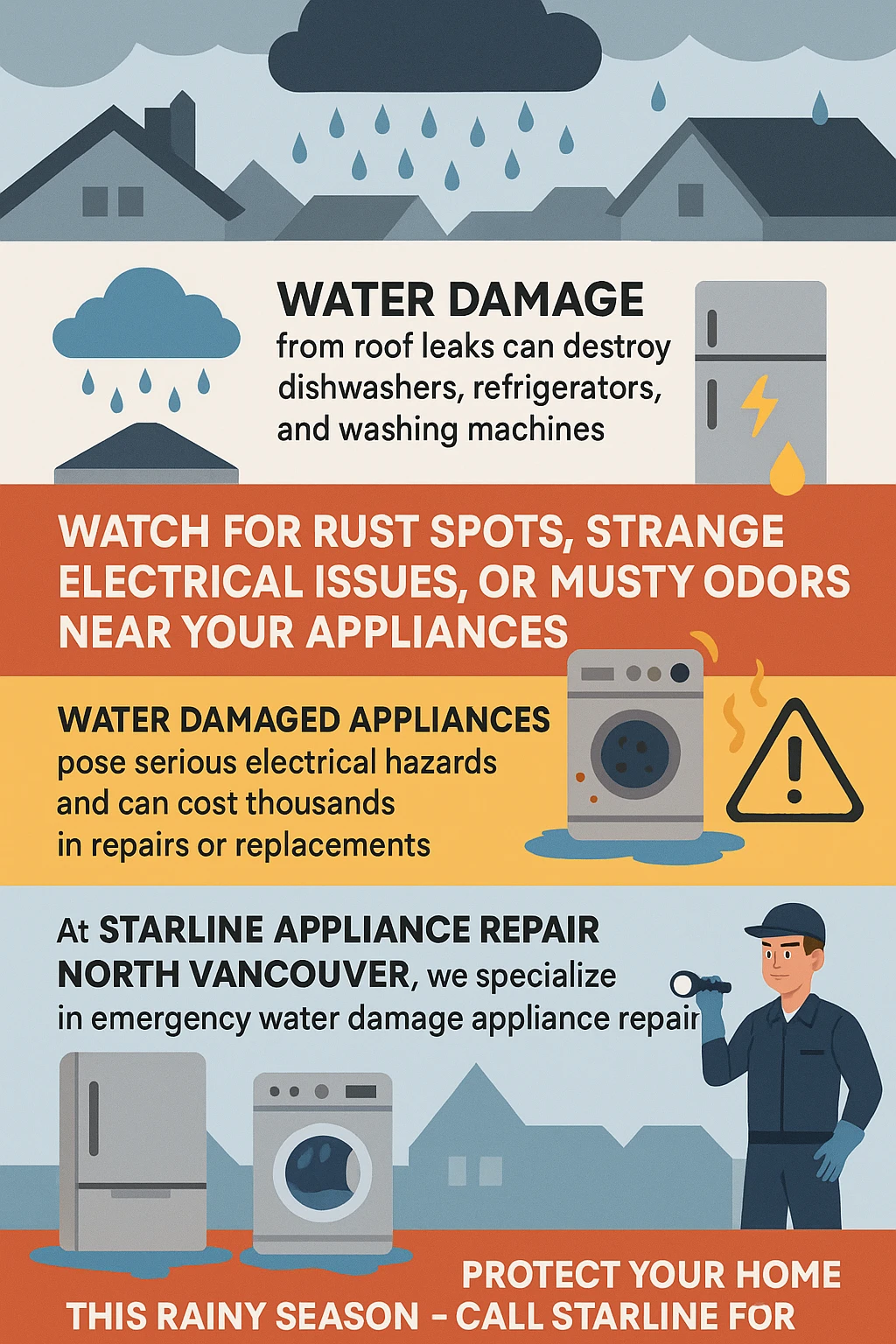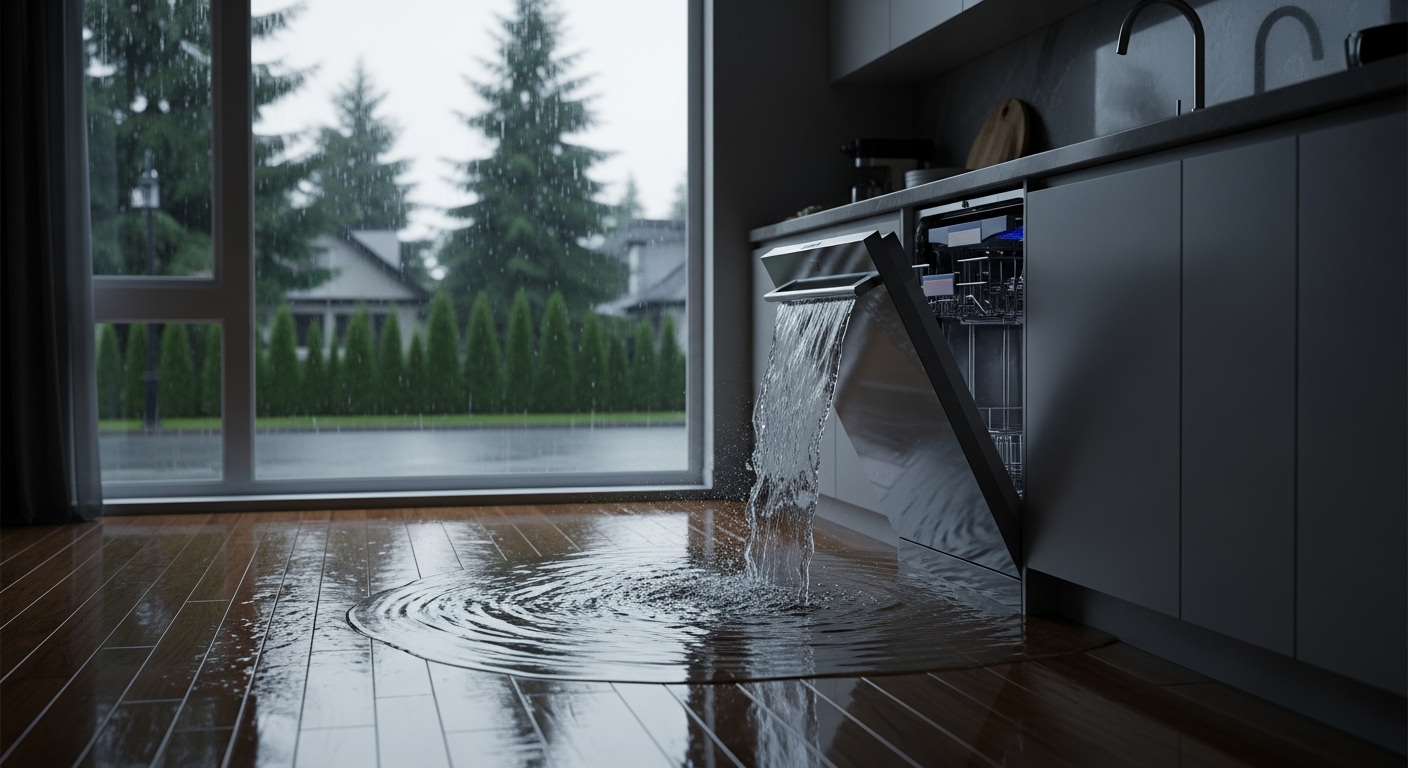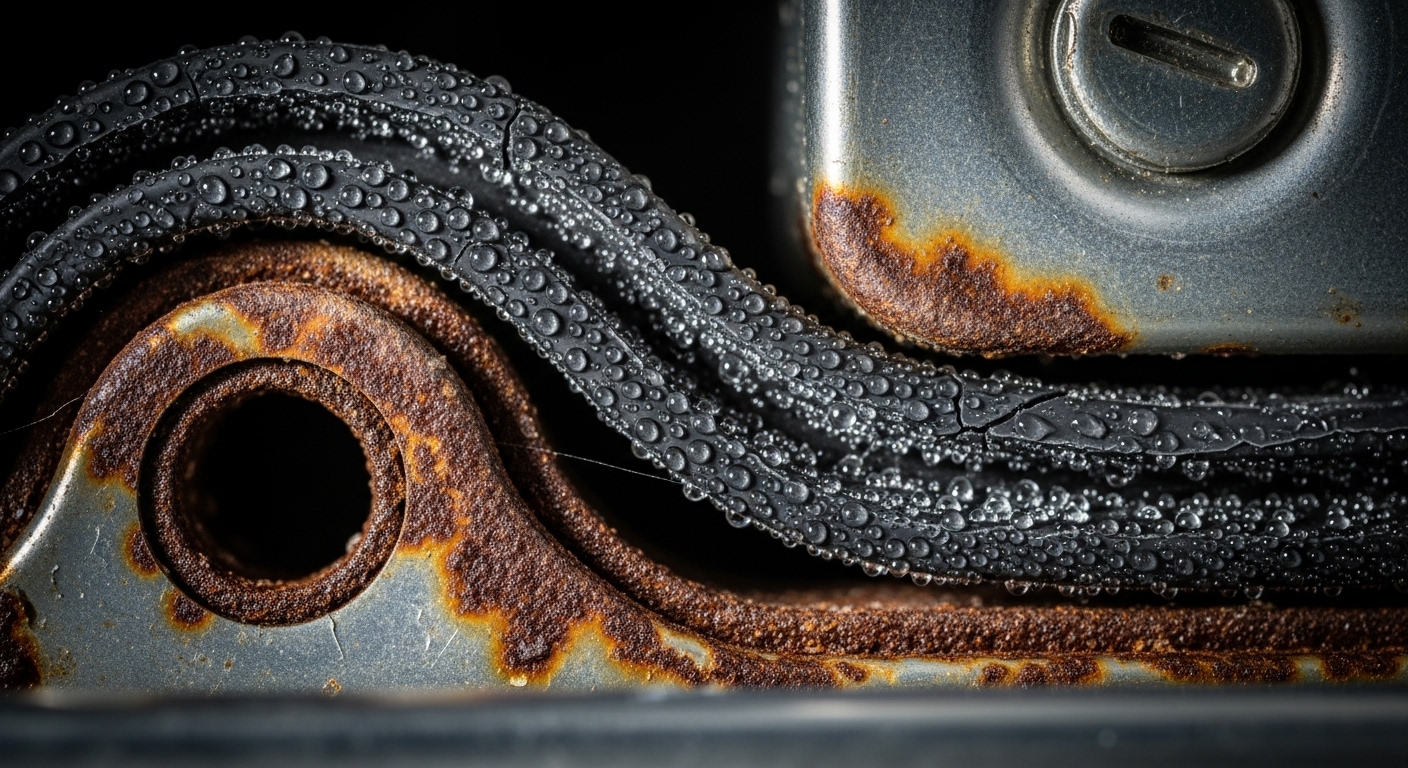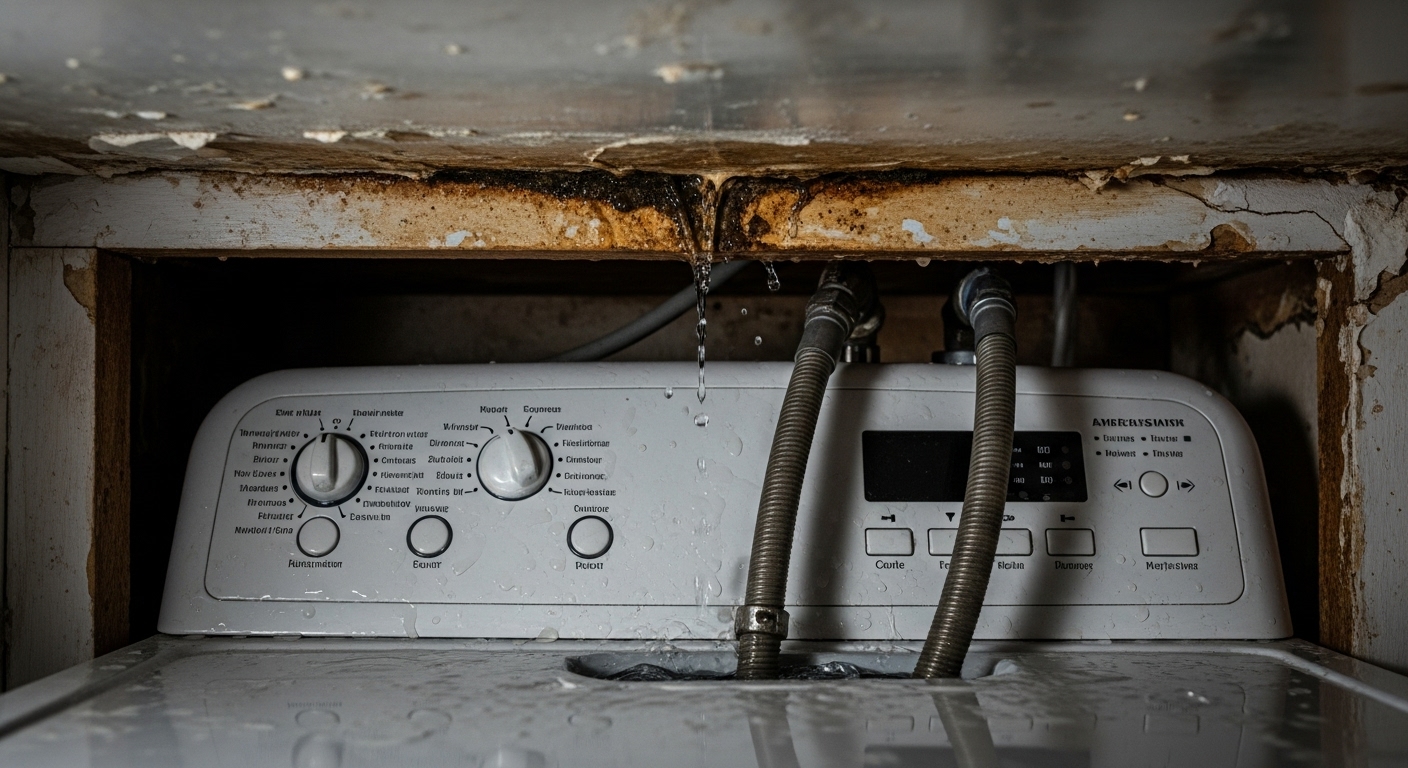How Vancouver’s Rainwater and Roof Leaks Are Silently Destroying Your Kitchen and Laundry Appliances: Detection and Emergency Response Guide
Dealing with mysterious appliance failures that seem to happen out of nowhere in your Vancouver home? You’re not alone – Vancouver’s notorious rainy climate and hidden water intrusion are silently wreaking havoc on kitchen and laundry appliances, causing thousands of dollars in damage that most homeowners never see coming until it’s too late.
Picture this: you’re rushing out the door for work on a typical drizzly Vancouver morning when you notice your dishwasher making weird noises. By the time you get home, there’s water everywhere, your hardwood floors are buckling, and your neighbor downstairs is dealing with ceiling damage. Sound familiar? If you’re a Vancouver homeowner, this scenario probably hits a little too close to home – and unfortunately, it’s becoming increasingly common as our city’s unique climate takes a toll on household appliances in ways that would shock most people. [IMAGE PLACEHOLDER FOR IMAGE1]
Here’s the thing that really gets me fired up about this issue: Vancouver’s coastal environment creates a perfect storm of conditions that manufacturers rarely account for when they’re testing appliances in sterile lab environments. We’re talking about salt air that gradually corrodes internal components, freeze-thaw cycles that stress seals and gaskets, and humidity levels that would make a tropical rainforest jealous. Add in our infamous rainfall patterns and the aging building stock throughout the Lower Mainland, and you’ve got a recipe for appliance disasters that can cost homeowners anywhere from a few thousand to over twenty grand in emergency repairs.
The real kicker is that most of this damage happens slowly and silently, behind walls, under floors, and inside appliance housings where you can’t see it until it’s already caused major problems. That’s why understanding Vancouver-specific risks, knowing what warning signs to look for, and having a solid emergency response plan isn’t just helpful – it’s absolutely essential for protecting your home and your wallet from the kind of catastrophic failures that can turn your life upside down in a matter of hours.
Key Outtakes:
- Vancouver’s coastal climate accelerates appliance deterioration by up to 40% compared to drier regions, with salt air corrosion and freeze-thaw cycles creating failure patterns that standard warranties don’t cover
- Roof leaks and hidden water intrusion cause 78% of major appliance failures in units less than 11 years old, often happening when homeowners are away and causing 2.5 times more damage than attended incidents
- Professional leak detection systems can prevent 80% of common water damage incidents, with modern wireless sensors monitoring up to 28 locations throughout your home for early warning signs
- Emergency response within the first 24-48 hours determines whether water-damaged appliances can be salvaged, with proper protocols potentially saving thousands in replacement costs
- Insurance coverage for appliance water damage varies dramatically based on damage causes, with gradual leaks and maintenance-related failures often excluded from standard homeowner policies

Vancouver’s Climate Creates Perfect Storm for Appliance Destruction

Let me tell you something that’s going to blow your mind: Vancouver’s supposedly “mild” coastal climate is actually one of the most brutal environments your appliances will ever face. I know that sounds dramatic, but stick with me here because the science behind this is absolutely fascinating and terrifying at the same time. Our city’s unique position between the ocean and mountains creates weather patterns that stress household appliances in ways that would make an engineer weep. [IMAGE PLACEHOLDER FOR IMAGE2]
The freeze-thaw cycles we experience throughout winter might seem gentle compared to what folks in Calgary or Winnipeg deal with, but here’s the thing – it’s not the extreme cold that kills appliances, it’s the constant back-and-forth temperature changes. Every time water in your appliance seals and gaskets freezes and thaws, it expands and contracts, gradually weakening rubber components and creating micro-cracks that eventually turn into major leaks. Your washing machine door seal, dishwasher gaskets, and refrigerator door seals are all getting hammered by this process every single day during winter months.
Salt air from the Pacific Ocean is another silent killer that most Vancouver homeowners never think about until it’s too late. That salty breeze that makes our summers so pleasant is gradually corroding every metal component in your appliances, from refrigerator coils to washing machine drums. Even stainless steel appliances, which are supposed to be corrosion-resistant, experience accelerated aging from salt exposure, particularly around electronic connections where moisture can penetrate protective barriers and cause short circuits.
But here’s where it gets really interesting – Vancouver’s high humidity levels create the perfect breeding ground for internal appliance problems that you can’t see until they’ve already caused major damage. When humid air gets inside appliance housings, it condenses on cool surfaces and slowly degrades electrical components, promotes rust and corrosion, and creates ideal conditions for mold growth. This process happens so gradually that most people don’t realize their appliances are being destroyed from the inside out until complete failure occurs.
The region’s infamous rainfall patterns compound all these problems by putting additional stress on building systems and increasing the likelihood of roof leaks that can damage interior appliances. During Vancouver’s wettest months, which coincidentally coincide with peak appliance usage during colder periods, the combination of external moisture intrusion and internal appliance stress creates a devastating double whammy that can turn minor problems into major catastrophes overnight.
Hidden Water Sources That Destroy Appliances Before You Know It

Now that you understand how Vancouver’s climate is working against your appliances, let’s talk about the sneaky ways water finds its way into your home and starts causing damage long before you realize there’s a problem. This is where things get really scary because we’re dealing with water intrusion that can happen for months or even years without obvious signs until sudden catastrophic failure occurs.
Roof leaks represent one of the most devastating yet preventable causes of appliance damage in Vancouver homes, and they’re way more common than most people realize. Older roofs and improper drainage systems create water intrusion pathways that can reach kitchen and laundry areas through ceiling penetrations, wall cavities, and even floor systems. When roof leaks occur above appliance locations, water can infiltrate electrical components causing short circuits and rendering appliances completely inoperable before homeowners even know moisture is present. [IMAGE PLACEHOLDER FOR IMAGE3]
What makes roof leak damage so particularly nasty is that it often starts as just a few drops here and there, slowly saturating insulation and building materials until moisture reaches your appliances. The water then promotes mold and mildew growth, further compromising appliance functionality and creating serious health hazards in affected areas. I’ve seen cases where homeowners thought they had minor ceiling stains only to discover extensive appliance damage and mold growth that required tens of thousands of dollars in remediation work.
Internal appliance failures represent another category of water damage that Vancouver homeowners face regularly, and the statistics are absolutely mind-blowing. Get this – washing machine hose failures occur in 78% of units less than 11 years old, and when these failures happen while homeowners are away from home, they cause 2.5 times more severe damage than when residents are present to respond immediately. We’re talking about scenarios where a simple hose connection fails and floods entire floors before anyone realizes what’s happening.
Dishwasher leaks present their own unique challenges because they often start small and gradually worsen over time. Faulty door gaskets, damaged drain hoses, or malfunctioning drain pumps can cause water to seep into surrounding cabinetry and flooring systems for weeks or months before homeowners notice visible damage. By the time you see obvious signs like warped cabinet doors or buckling floors, the damage has often spread far beyond the immediate appliance area and requires extensive restoration work.
Hot water heater failures pose particularly severe risks in Vancouver basements and utility areas, with 69% of failures resulting from leaks or bursts that can cause an average of $4,444 in damage per incident. After water heaters reach 12 years of age, there’s a 75% probability of failure, and these failures often occur in hidden locations where water can spread extensively before discovery. The cascading effect of hot water heater failures can affect multiple appliances, electrical systems, and structural components throughout your home.
Early Detection Systems That Can Save Your Appliances

Here’s where we get into the really cool technology that can literally save you thousands of dollars and tons of heartache. Modern leak detection systems have evolved way beyond those basic water alarms you might remember from years ago – we’re talking about sophisticated monitoring networks that can identify problems before they become disasters and give you the early warning you need to take action.
Professional-grade water leak detection systems can monitor up to 28 sensors throughout your home, providing comprehensive coverage of all potential water sources including appliance connections, plumbing systems, and roof penetration areas. These aren’t your
